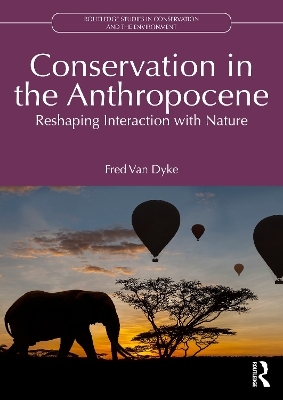
Conservation in the Anthropocene
Routledge (Verlag)
978-1-032-51107-8 (ISBN)
- Noch nicht erschienen (ca. April 2025)
- Versandkostenfrei innerhalb Deutschlands
- Auch auf Rechnung
- Verfügbarkeit in der Filiale vor Ort prüfen
- Artikel merken
This book provides a critical assessment of conservation in the Anthropocene grounded in the personal, historical, and cultural development of human interaction with nature.
This book argues that conservation can no longer be primarily about preserving nature but must adapt its efforts to promote changes through which humans create a landscape that is neither abandoned nor degraded but used well by humans and non-humans alike. The book firstly reviews the origin of ideas and conditions that have led to the concept and classification of the Anthropocene and explores how the author’s own interactions with nature were shaped through his experience as a conservation biologist. Next, it explores how humans have come to be the primary drivers of ecological activity, geological events, and climate change. Chapters then focus on the need for new conservation thinking regarding novel ecosystems, urban conservation, the role of Indigenous Peoples in conservation, and the value of protected areas, parks, and wilderness. The book concludes by identifying strategies for effective conservation and argues for a new formulation of conservation values that redefine human relationships and interaction with nature. Chapters are enlivened by the personal experiences of the author and the first-person narratives of conservation activists and scientists who are learning to practice and succeed in conservation efforts under Anthropogenic conditions.
Drawing on global examples, this book will be of great value to students and scholars of biodiversity conservation and environmental science ready to consider a new way of looking at the care and nurture of nature in the Anthropocene.
Fred Van Dyke is an independent consultant providing guidance in conservation research and education, professional development, writing for publication, and organizational leadership. Previously he was Executive Director of the Au Sable Institute and Professor of Biology at Wheaton College, USA. He has also worked as a wildlife biologist for the Montana Department of Fish, Wildlife and Parks, a contract biologist for the US Fish and Wildlife Service and the US Forest Service, and as a consultant to the US National Park Service and private industry. He is the co-author of Conservation Biology: Foundations, Concepts, Applications, 3rd ed (2020).
1. Confessions from the Beartooths 2. The Present Age: The Onset of the Anthropocene 3. The Ecology of the Anthropocene 4. Geology in the Anthropocene 5. Climate Change: The Signature of the Anthropocene 6. Conservation and the Novel Ecosystem 7. Conservation in the Urban Ecosystem 8. Indigenous Peoples and Conservation 9. Protected Areas, Parks, and Wilderness 10.Conservation Interventions – Saving Species Like We Mean It 11.Values to Guide the Anthropocene
| Erscheint lt. Verlag | 1.4.2025 |
|---|---|
| Reihe/Serie | Routledge Studies in Conservation and the Environment |
| Zusatzinfo | 19 Line drawings, black and white; 42 Halftones, black and white; 61 Illustrations, black and white |
| Verlagsort | London |
| Sprache | englisch |
| Maße | 174 x 246 mm |
| Themenwelt | Naturwissenschaften ► Biologie ► Botanik |
| Naturwissenschaften ► Biologie ► Ökologie / Naturschutz | |
| ISBN-10 | 1-032-51107-9 / 1032511079 |
| ISBN-13 | 978-1-032-51107-8 / 9781032511078 |
| Zustand | Neuware |
| Haben Sie eine Frage zum Produkt? |
aus dem Bereich


